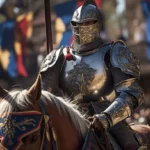Medieval history is a fascinating period full of knights, castles, and epic battles. For those unfamiliar with this era, let’s embark on a journey through time to understand the basics of medieval history.

Credit: www.facebook.com
The Middle Ages
The medieval period, also known as the Middle Ages, spanned from the 5th to the 15th century. It was a time of significant social, political, and economic change in Europe. The Middle Ages can be divided into three distinct periods: the Early Middle Ages, the High Middle Ages, and the Late Middle Ages.
The Early Middle Ages
The Early Middle Ages began with the fall of the Western Roman Empire in 476 AD and lasted until around the 10th century. During this time, Europe was decentralized, and various Germanic tribes established their own kingdoms. Charlemagne, the King of the Franks, emerged as a powerful ruler and played a crucial role in unifying parts of Europe.
| Key Points | Key Figures |
|---|---|
|
|
The High Middle Ages
The High Middle Ages saw significant advancements in agriculture, trade, and urbanization. It was a time of cultural and intellectual growth, with the rise of universities and the construction of magnificent Gothic cathedrals. Feudalism, a hierarchical society based on land ownership and military service, was prevalent during this period.
| Key Points | Key Figures |
|---|---|
|
|
The Late Middle Ages
The Late Middle Ages witnessed significant social and political challenges, including the Hundred Years’ War and the decline of feudalism. The period also saw the emergence of powerful nation-states, such as France and England, and the dawn of Renaissance and Reformation.
| Key Points | Key Figures |
|---|---|
|
|

Credit: www.amazon.com
Medieval Society and Culture
Medieval society was divided into distinct social classes. At the top were the monarchs and nobility, who controlled vast lands and held significant political power. The majority of people were peasants who worked the land and were subject to the rule of the nobility. Religion played a central role, with the Catholic Church being the dominant institution.
Medieval culture was rich and diverse. Chivalry was a code of conduct followed by knights, emphasizing virtues such as honor, bravery, and loyalty. Gothic architecture, with its majestic cathedrals and stained glass windows, emerged as a distinct architectural style. The troubadours entertained with songs and stories, and medieval literature flourished with works like “The Canterbury Tales” by Geoffrey Chaucer.
The Legacy of the Middle Ages
The Middle Ages left a lasting impact on European history. It laid the foundations for the nation-states that would shape the modern world. The period also witnessed advancements in art, literature, and science, setting the stage for the Renaissance.
Despite the romanticized depiction, the Middle Ages were not without their challenges. The period was marked by social inequality, religious conflicts, and widespread disease. However, it also spurred innovation and the pursuit of knowledge.
As we conclude our journey through medieval history, we have only scratched the surface of this vast and captivating era. Delving deeper into the stories of knights, kings, and serfs opens up a world of wonder and appreciation for the trials and triumphs of our medieval ancestors.
Frequently Asked Questions On Medieval History For Beginners : Uncover The Fascinating Tales
What Were The Main Causes Of The Medieval Period?
The main causes of the Medieval period were the fall of the Roman Empire, invasions, and political instability.
How Did The Feudal System Work During The Middle Ages?
The feudal system during the Middle Ages worked by granting land in exchange for military service and loyalty to a lord.
What Role Did Religion Play During The Medieval Era?
Religion played a central role in the Medieval era, with Christianity being the dominant religion and influencing all aspects of life.
What Were The Major Accomplishments In Medieval Architecture?
Major accomplishments in Medieval architecture include Gothic cathedrals, castles, and monastic buildings known for their grandeur and innovative design.
Guest Author Sakhawat-Shuvo wrote and edited this Article based on his best knowledge and understanding. These opinions and remarks are not endorsed or guaranteed by epichistoria.com or EpicHistoria. The Epic Historia does not guarantee this article’s content. Readers should verify and use their judgment before trusting the content. Also, the Images used in this Article are the copyright of their Respective Owners. Please use our Comment Box or Contact Us form to report this content. This information is not accountable for losses, injuries, or damages.


